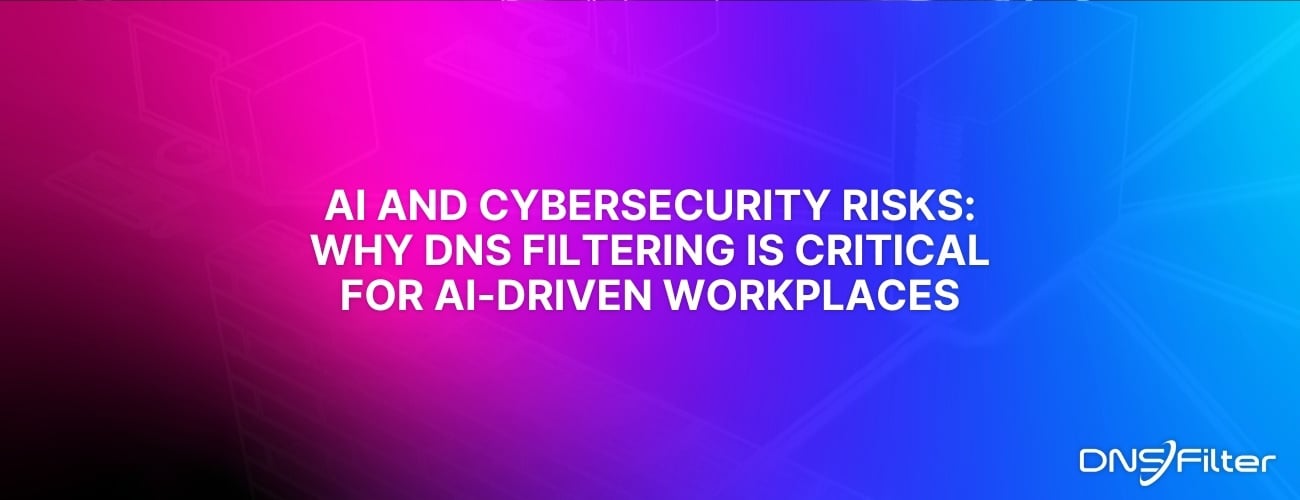Share this
AI vs AI: Using DNS to Combat Sophisticated Cyberattacks
by Kory Underdown on Feb 11, 2025 6:40:30 PM
Introduction: The AI Cybersecurity Arms Race
Artificial intelligence (AI) has transformed the cybersecurity landscape—both for defenders and attackers. While AI-powered cybersecurity solutions offer advanced threat detection, AI-driven cybercrime is evolving at an alarming rate, automating attacks that are more sophisticated, evasive, and dangerous.
The result? An AI vs AI arms race, where organizations must deploy AI-driven cybersecurity solutions to stay ahead of AI-powered attacks. Among the most effective tools in this battle is DNS protection, which serves as a first line of defense against AI cyberattacks by detecting and blocking malicious domains before they can cause damage.
This article explores how AI is used in cybercrime, the types of AI attacks that have become more efficient, and how AI-powered DNS security can protect organizations against these emerging threats.
The Rise of AI-Powered Cyber Threats
The integration of AI into cybercrime has drastically increased the speed, scale, and efficiency of attacks. Hackers no longer need to manually craft phishing emails or brute-force passwords—AI automates these processes, making cyberattacks more dangerous than ever before.
Which Types of Attacks Are Becoming More Effective with AI?
In our recent 2025 Annual Security Report, we found that AI made up 14% of all threat traffic on the DNSFilter network in a one-year period—36% higher than malware alone.
Several types of cyberattacks have become significantly more effective due to AI, forcing cybersecurity professionals to adopt AI-driven cybersecurity solutions to counteract them:
|
AI Phishing Attacks Traditional phishing relies on mass email blasts with generic messages. AI phishing attacks, however, leverage machine learning to personalize phishing emails in real-time, using stolen data to mimic trusted contacts and bypass security filters. |
Automated Credential Stuffing AI enables cybercriminals to test thousands of stolen credentials in seconds, significantly increasing the success rate of account takeovers. |
Which Type of Attack Is More Effective with AI? |
|
|
AI-Powered Malware Attackers use AI-driven malware that adapts its code dynamically to evade detection, making it harder for traditional antivirus software to block threats. |
Deepfake Social Engineering AI-generated deepfake voices and videos are being used for cyber security scams, tricking employees into transferring money or sharing sensitive data. |
How Cybercriminals Use AI for Advanced Attacks
The combination of AI and cybercrime is a growing concern for organizations worldwide.
Understanding Zero-Day Vulnerabilities
- AI-Powered Reconnaissance: Attackers use AI to scan for network vulnerabilities at a pace no human could match, identifying weak points in security infrastructure.
- Automated Social Engineering Attacks: AI analyzes publicly available information to craft highly convincing phishing messages that bypass traditional filters.
- AI in Ransomware Attacks: Ransomware groups use AI to optimize encryption methods and evade detection, making attacks more effective and harder to stop. Ransomware costs are projected to reach around $265 billion USD annually by 2031, significantly up from $20 billion in 2021.
- Cyber Security Scams Using AI: Scammers are using AI-generated voices to impersonate executives in cyber security scam scenarios, tricking employees into transferring funds or revealing confidential data.
The FBI has warned that AI-powered cyber threats are escalating, reinforcing the urgency for organizations to bolster their security measures.
With AI being used to automate cybercrime, organizations must evolve their security strategies accordingly. AI-powered cybersecurity solutions, particularly at the DNS level, provide one of the most effective defenses.
The Role of DNS in AI-Driven Cybersecurity
Many organizations focus on endpoint protection, firewalls, and traditional threat detection systems, but protective DNS plays a crucial role in AI-driven cybersecurity. DNS is often overlooked as a security layer, yet it is one of the most effective ways to detect and stop cyber threats before they can cause harm.
Unlike traditional security solutions that react to threats after they have infiltrated a system, AI-powered DNS security provides a proactive approach. By monitoring and filtering DNS requests in real time, security teams can block malicious activity at its source—before it ever reaches users or critical infrastructure. This is especially important in the face of AI-powered attacks, where cybercriminals use AI to rapidly generate new malicious domains, automate phishing campaigns, and deploy evolving malware.
How Can DNS Be Used to Combat Cyber Attacks?
DNS filtering acts as a first line of defense against AI-driven threats by:
- Blocking Malicious Domains: AI-powered DNS security solutions continuously scan and identify domains associated with phishing, malware, and botnets. By blocking these domains before a connection is established, organizations prevent infections from ever occurring.
- Detecting Anomalous Traffic Patterns: AI-driven threat detection analyzes DNS requests in real-time, looking for unusual patterns that may indicate a compromised device, data exfiltration, or command-and-control (C2) communication.
- Preventing Data Exfiltration: Many AI cyberattacks use DNS tunneling to bypass firewalls and extract sensitive data. DNS filtering stops these attempts by detecting and blocking suspicious DNS queries before they can be exploited.
- Reducing the Impact of Zero-Day Threats: Traditional security solutions rely on databases of known threats, but AI-enhanced DNS security uses predictive analytics to identify and block emerging threats—even those that have never been seen before.
The Future of AI-Powered DNS Security
As cyber threats continue to evolve, AI defense models will need to become increasingly adaptive, anticipating cyber threats before they occur to minimize potential damage.
DNS technology will also see significant advancements, with enhanced AI-powered DNS security solutions that proactively identify and block AI cyberattacks with even greater accuracy.
The battle of AI vs AI will persist, as both attackers and defenders refine their tactics, but organizations that integrate AI-driven DNS security into their cybersecurity strategy will be better positioned to stay ahead of these ever-evolving threats.
According to IBM, organizations that deployed security AI and automation saved an average of $1.76 million on data breach costs, compared to those that did not deploy these technologies. Companies with fully deployed security AI/automation also contained breaches 108 days faster on average.
Stay Ahead with AI-Driven DNS Protection
The rise of AI-powered attacks demands an equally sophisticated defense strategy. Organizations must proactively secure their networks with AI-driven cybersecurity solutions, particularly at the DNS level.
Don’t wait for an attack to happen—stay ahead of the AI cybersecurity arms race with a free trial of DNSFilter.
Share this
 Artificial Intelligence in Cybersecurity
Artificial Intelligence in Cybersecurity
The term “artificial intelligence (AI)” was first coined in 1956. While progress stalled for many years, we can thank IBM for sparking real interest in AI as viable technology: First in 1997 when the computer Deep Blue defeated a chess champion and again in 2011 when Watson won Jeopardy!
 The Mind Games Behind Cyber Attacks
The Mind Games Behind Cyber Attacks
Hackers have long understood that the most sophisticated firewall is no match for a well-placed psychological trick. While many focus on the technical prowess of cybercriminals, the real magic often lies in their ability to manipulate human behavior. By exploiting our natural tendencies and cognitive biases, hackers can slip past even the most robust security systems. It's not just about cracking codes; it's about cracking the human psyche.
 AI and Cybersecurity Risks: Why DNS Filtering is Critical for AI-Driven Workplaces
AI and Cybersecurity Risks: Why DNS Filtering is Critical for AI-Driven Workplaces
Artificial intelligence is transforming business operations, automating everything from customer service to data analysis. But with these advancements come new security challenges. AI-driven cyber threats are becoming more sophisticated, enabling attackers to automate phishing campaigns, generate malware, and exfiltrate sensitive data at scale. Without proper safeguards, AI tools can unintentionally leak corporate secrets or connect to malicious ...


